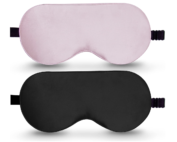What is Meditation?
There are different ways to meditate, and since it’s such a personal practice there are probably more than any of us know about. There are a couple that are usually focused on heavily in scientific research, though. These are focused-attention, or mindful meditation, which is where you focus on one specific thing—it could be your breathing, a sensation in your body or a particular object outside of you. The point of this type of meditation is to focus strongly on one point and continually bring your attention back to that focal point when it wanders.
What happens in your brain when you meditate?
Meditation can have a variety of effects on the brain, depending on the specific type of meditation and the individual’s experience and practice. Here are some of the general effects that have been observed:
- Changes in brain waves: Different types of meditation can have different effects on brain waves, which are the electrical patterns of activity in the brain. For example, some types of meditation, such as mindfulness meditation, have been shown to increase alpha waves, which are associated with relaxation and creativity, while decreasing beta waves, which are associated with anxiety and stress.
- Increased activity in certain brain regions: Studies have shown that regular meditation practice can increase the activity and size of certain regions of the brain, such as the prefrontal cortex, which is associated with attention and decision-making, and the insula, which is involved in awareness and self-reflection.
- Reduced activity in the default mode network: The default mode network is a network of brain regions that are active when the brain is at rest and not engaged in any specific task. Studies have shown that meditation can reduce the activity in this network, which is associated with mind-wandering and self-referential thinking.
- Increased production of neurotransmitters: Meditation has been shown to increase the production of certain neurotransmitters, such as dopamine and serotonin, which are associated with mood regulation and positive emotions.
Overall, meditation can have a variety of effects on the brain, including changes in brain waves, increased activity in certain brain regions, reduced activity in the default mode network, and increased production of neurotransmitters. These effects can contribute to the relaxation, stress reduction, and other benefits that are associated with regular meditation practice.
What happens in each part of the brain during meditation?
- Frontal Lobe: This is the most highly evolved part of the brain, responsible for reasoning, planning, emotions and self-conscious awareness. During meditation, the frontal cortex tends to go offline.
- Parietal Lob: This part of the brain processes sensory information about the surrounding world, orienting you in time and space. During meditation, activity in the parietal lobe slows down.
- Thalamus: The gatekeeper for the senses, this organ focuses your attention by funneling some sensory data deeper into the brain and stopping other signals in their tracks. Meditation reduces the flow of incoming information to a trickle.
- Reticular Formation: As the brain’s sentry, this structure receives incoming stimuli and puts the brain on alert, ready to respond. Meditating dials back the arousal signal.
Top Benefits from Meditation:
Meditation trains us to focus our attention and recognize when it starts to wander, which enhances our ability to concentrate even when we are not meditating. Regular sessions of meditation have a long-lasting effect. Similar to a muscle that needs to be strengthened through training is focused attention.
Although this statement is rather technical, it is really intriguing. It turns out that the reason we experience less anxiety the more we meditate is because we’re actually shortening the connections of specific neuronal circuits. This might sound horrible, but it’s not.
Without meditation, the medial prefrontal cortex, which is frequently referred to as the “Me Center” in our brains, becomes overactive. This section is responsible for processing information about us and our past experiences. The neurological connections between the brain’s fear and body feeling centers and the Me Center are often very strong. When you encounter a frightening or unpleasant sensation, your Me Center has a powerful reaction that makes you feel threatened and terrified.
Weakening this neuronal link during meditation. Because of this, we no longer respond as intensely to sensations that once sparked our Me Centers. Weakening this link also strengthens the link between our assessment center, which is the reasoning portion of our brains, and our centers for bodily experience and terror. Consequently, when we encounter frightening or disturbing feelings, we may more readily consider them objectively.
As a writer, this is something I’m constantly curious about, and we’ve already gone into great detail about the science of creation. Although it’s not the most straightforward subject to explore, there is some evidence that suggests meditation may influence our creativity. To investigate if there was any gain in creativity afterward, researchers at Leiden University in the Netherlands looked at both focused-attention and open-monitoring mediation. They discovered that focused-attention meditation practitioners did not significantly improve on the creativity challenge after their meditation. Yet, those who practiced open-monitoring meditation did better on a challenge that required them to generate fresh thoughts.
Improved memory recall is one of the things meditation has been connected to. According to Catherine Kerr, a researcher at the Osher Research Center and the Martinos Center for Biomedical Imaging, those who practice mindful meditation were able to change the brain wave that blocks out distractions and boost their productivity more quickly than those who did not. According to her, “their higher ability to rapidly retain and absorb new data” may be explained by their capacity to ignore distractions. This appears to be very comparable to the ability of exposure to novel settings, which will likewise significantly enhance our recall of things.
Those who practice mindful meditation have been demonstrated to perform better under pressure and experience less stress. In a 2012 study, a group of human resources managers was divided into three groups, with one third receiving training in mindful meditation, another third receiving instruction in body relaxation, and the third receiving no training at all. Before and after the eight-week experiment, all the managers underwent a demanding multitasking test. In the final exam, the group that had taken the meditation training expressed less stress than either of the other groups during the test.
In the hippocampus and frontal regions of the brain, meditation has been associated with greater gray matter density. At first, I wasn’t sure what this meant, but it turns out it’s really awesome. Positive feelings, longer-lasting emotional stability, and improved attention in daily life can all be attributed to having more gray matter.
Also, studies have demonstrated that meditation slows the deterioration of our cognitive abilities and age-related impacts on gray matter.
Other ways meditation can help:
- Your brains ability to change, structurally and functionally (called neuroplasticity) allowing you to better control your thoughts and reactions
- To decrease respiratory rates and blood pressure
- To create thicker cortical walls in the brain, improving decision making, attention, and memory
- To decrease feelings of depression and irritability
- To slow the process of aging by protecting your telomeres
- To decrease muscle tension, stress, and pain











